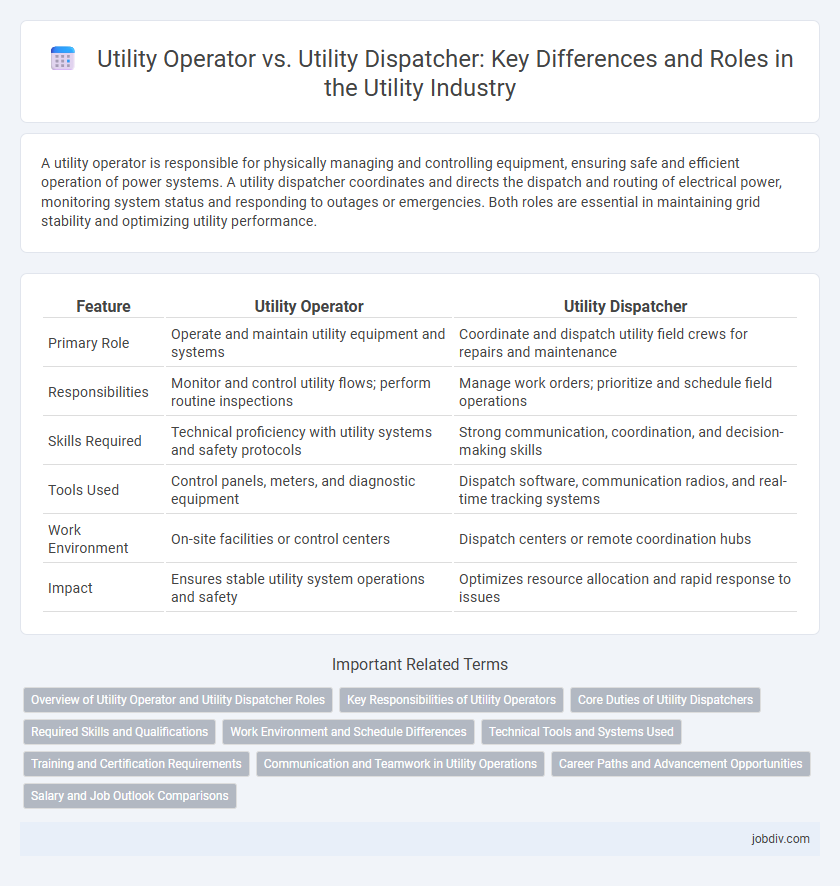A utility operator is responsible for physically managing and controlling equipment, ensuring safe and efficient operation of power systems. A utility dispatcher coordinates and directs the dispatch and routing of electrical power, monitoring system status and responding to outages or emergencies. Both roles are essential in maintaining grid stability and optimizing utility performance.
Table of Comparison
| Feature | Utility Operator | Utility Dispatcher |
|---|---|---|
| Primary Role | Operate and maintain utility equipment and systems | Coordinate and dispatch utility field crews for repairs and maintenance |
| Responsibilities | Monitor and control utility flows; perform routine inspections | Manage work orders; prioritize and schedule field operations |
| Skills Required | Technical proficiency with utility systems and safety protocols | Strong communication, coordination, and decision-making skills |
| Tools Used | Control panels, meters, and diagnostic equipment | Dispatch software, communication radios, and real-time tracking systems |
| Work Environment | On-site facilities or control centers | Dispatch centers or remote coordination hubs |
| Impact | Ensures stable utility system operations and safety | Optimizes resource allocation and rapid response to issues |
Overview of Utility Operator and Utility Dispatcher Roles
Utility operators manage the daily operation and maintenance of utility systems, such as electricity, water, or gas, ensuring continuous service delivery and safety compliance. Utility dispatchers coordinate and monitor field personnel, respond to service requests, and manage emergency situations through effective communication and resource allocation. Both roles are critical in maintaining system reliability, with operators focusing on hands-on system control and dispatchers overseeing logistical and operational coordination.
Key Responsibilities of Utility Operators
Utility operators manage and maintain essential infrastructure systems such as water, gas, and electricity to ensure continuous service delivery. They monitor equipment performance, conduct routine inspections, and perform necessary repairs to prevent system failures. Operators also respond swiftly to emergencies, coordinating with dispatchers to restore utility services efficiently.
Core Duties of Utility Dispatchers
Utility dispatchers coordinate real-time operations by managing the flow of information between field technicians and control centers, ensuring timely response to outages and emergencies. They monitor system performance and prioritize service restoration efforts using advanced communication and dispatch systems. Core duties include tracking resource allocation, updating maintenance schedules, and maintaining accurate records to optimize utility service reliability.
Required Skills and Qualifications
Utility Operators require strong technical skills in operating and maintaining utility equipment, with qualifications often including vocational training or certifications in electrical or mechanical systems. Utility Dispatchers need excellent communication and organizational abilities to coordinate service calls and manage emergency responses, typically requiring experience in dispatch operations and proficiency with dispatch software. Both roles demand problem-solving capabilities, attention to detail, and a solid understanding of safety protocols in the utility sector.
Work Environment and Schedule Differences
Utility Operators typically work on-site at power plants or substations, managing equipment and overseeing system operations directly, often following fixed shifts that may include evenings and weekends. Utility Dispatchers usually operate from centralized control rooms, coordinating and monitoring utility service delivery remotely with schedules that emphasize rapid response, frequently involving irregular hours or on-call duties. The distinct work environments influence the nature of their schedules: Operators maintain consistent physical presence, while Dispatchers handle dynamic, real-time communication and coordination tasks.
Technical Tools and Systems Used
Utility operators primarily rely on supervisory control and data acquisition (SCADA) systems to monitor and control physical equipment in real-time, ensuring the efficient operation of utility infrastructure. Utility dispatchers utilize advanced communication platforms, geographic information systems (GIS), and outage management systems (OMS) to coordinate field crews and manage service restoration effectively. Both roles leverage integrated software solutions for data analytics and system optimization, but operators focus more on direct equipment control while dispatchers emphasize coordination and incident response.
Training and Certification Requirements
Utility operators typically require certification in specific equipment operation and safety protocols, with training programs emphasizing hands-on experience and technical knowledge relevant to fieldwork. Utility dispatchers need specialized training in communication systems, emergency response coordination, and software for resource allocation, often acquiring certifications in emergency dispatch or public safety telecommunication. Both roles demand ongoing education to comply with industry standards and regulatory requirements, ensuring operational efficiency and safety.
Communication and Teamwork in Utility Operations
Utility operators maintain direct communication with field technicians to ensure seamless execution of energy distribution tasks, optimizing real-time operational efficiency. Utility dispatchers coordinate multiple utility operators and field crews, facilitating effective teamwork through centralized communication platforms for rapid response to outages and emergencies. Both roles rely heavily on clear, concise information exchange and collaborative problem-solving to maintain grid stability and service reliability.
Career Paths and Advancement Opportunities
Utility operators typically manage the day-to-day operation of power plants or water treatment facilities, offering entry-level roles with hands-on technical experience. Utility dispatchers coordinate the distribution and transmission of utility services, providing higher responsibility positions that require strong communication and problem-solving skills. Career advancement for operators often leads to supervisory roles, while dispatchers can progress into senior management or system planning positions within utility companies.
Salary and Job Outlook Comparisons
Utility operators typically earn an average salary ranging from $45,000 to $65,000 annually, while utility dispatchers have a slightly higher average salary between $50,000 and $70,000 per year. The job outlook for utility operators is stable with moderate growth expected at about 5% over the next decade, whereas utility dispatchers are projected to experience a faster growth rate of approximately 7%, driven by increasing demand for efficient emergency and technical response coordination. Both roles require strong technical skills, but utility dispatchers often benefit from higher earning potential due to their critical role in managing communication and incident response.
Utility Operator vs Utility Dispatcher Infographic

 jobdiv.com
jobdiv.com